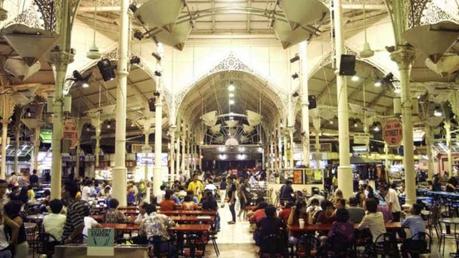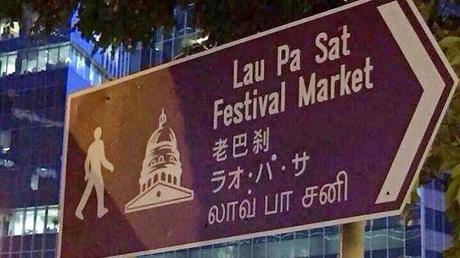 Telok Ayer Market [also
known colloquially as Lau Pa Sat] ("old market"), is a historic
building in Singapore, located in
Downtown Core within the Central Area, Singapore's central business district.
It is currently a food center. There are several shops inside the market such
as a 24 hours Cheers Store, a shoe repair shop, a tailor and a laundry store.
In the evenings on the weekend a live band plays at the stage in the middle of
the market. Singapore's first market was
located at the south bank of the Singapore River. It is stated that when Telok Ayer Market first opened in 1825, it
extended over the sea. Jetties leading from the market allowed produce to be
loaded and unloaded directly onto boats.
The first para
error is because of ‘auto-text’, a facility available in Computer, mobiles and
other gadgets. It is a portion of a text
preexisting in the computer memory, available as a supplement to newly composed
documents, and suggested to the document author by software. AutoText “entries” are ready-made
(boilerplate) frequently used text (or graphics) that is available for use in
any document. Auto-text saves the time of users who type
many similar documents, or serves as an assistive technology. Most of us know that one can add auto-text
entries in MS Word and MS Excel formats.
Translation
software is another techno-tool. Mobile
translation is a machine translation service for hand-held devices, including
mobile telephones, Pocket PCs, and PDAs. It relies on computer programming in
the sphere of computational linguistics and the device's communication means
(Internet connection or SMS) to work. Mobile translation provides hand-held
device users with the advantage of instantaneous and non-mediated translation
from one human language to another.
With this tool, one
can freely type in English and have it sent in other vernacular languages,
though there will be words which may not get translated or translated with not
so appropriate meaning, due to bugs.
Though it may sound pretty innocuous, from a brand perspective, a devise or an app
or a translation tool may not recognise
brand names or proper nouns.
India learns and
those creating technology also needs to learn as there is big market and more
money in all these – as according to some estimates, smartphone penetration is
going to cross 180 million in a couple of years and 500 million in five years. And
as the reach goes longer, there will be more of native speakers who would be
using such equipments. Many companies like SAP and Infosys are
piloting mobility programmes to connect with small retailers better. But for connecting with small-time merchants,
applications that work in local vernacular languages would hold the key. According to market experts, Cloud-based
business models with language modules have enormous growth potential.
Here
is something on a wrong Tamil translation that went in circles in the net last
year. It is a photo showing the wrong
Tamil translation of popular food destination Lau Pa Sat on a signboard !
Telok Ayer Market [also
known colloquially as Lau Pa Sat] ("old market"), is a historic
building in Singapore, located in
Downtown Core within the Central Area, Singapore's central business district.
It is currently a food center. There are several shops inside the market such
as a 24 hours Cheers Store, a shoe repair shop, a tailor and a laundry store.
In the evenings on the weekend a live band plays at the stage in the middle of
the market. Singapore's first market was
located at the south bank of the Singapore River. It is stated that when Telok Ayer Market first opened in 1825, it
extended over the sea. Jetties leading from the market allowed produce to be
loaded and unloaded directly onto boats.
The first para
error is because of ‘auto-text’, a facility available in Computer, mobiles and
other gadgets. It is a portion of a text
preexisting in the computer memory, available as a supplement to newly composed
documents, and suggested to the document author by software. AutoText “entries” are ready-made
(boilerplate) frequently used text (or graphics) that is available for use in
any document. Auto-text saves the time of users who type
many similar documents, or serves as an assistive technology. Most of us know that one can add auto-text
entries in MS Word and MS Excel formats.
Translation
software is another techno-tool. Mobile
translation is a machine translation service for hand-held devices, including
mobile telephones, Pocket PCs, and PDAs. It relies on computer programming in
the sphere of computational linguistics and the device's communication means
(Internet connection or SMS) to work. Mobile translation provides hand-held
device users with the advantage of instantaneous and non-mediated translation
from one human language to another.
With this tool, one
can freely type in English and have it sent in other vernacular languages,
though there will be words which may not get translated or translated with not
so appropriate meaning, due to bugs.
Though it may sound pretty innocuous, from a brand perspective, a devise or an app
or a translation tool may not recognise
brand names or proper nouns.
India learns and
those creating technology also needs to learn as there is big market and more
money in all these – as according to some estimates, smartphone penetration is
going to cross 180 million in a couple of years and 500 million in five years. And
as the reach goes longer, there will be more of native speakers who would be
using such equipments. Many companies like SAP and Infosys are
piloting mobility programmes to connect with small retailers better. But for connecting with small-time merchants,
applications that work in local vernacular languages would hold the key. According to market experts, Cloud-based
business models with language modules have enormous growth potential.
Here
is something on a wrong Tamil translation that went in circles in the net last
year. It is a photo showing the wrong
Tamil translation of popular food destination Lau Pa Sat on a signboard !
 While the Tamil
words for Lau and Pa are correct on the signboard, the word Sat has been
translated into Sani, which means Saturday in Tamil. The word, however, can
also be used to curse people in Tamil and denotes ‘Sani baghawan’ connoting
negativism. Protesters say that such a negative meaning may rile some people.
It reportedly was
the work of some who did not know what Lau Pa Sat and what it represents. Some stated that such signs are typically put up by the Singapore
Tourism Board and there have been more instances of such failed
translations. There have also been
occasions, where translations would look in pictures totally incomprehensible,
when the font is not supported.
Technology
no doubt helps, when handled properly
With regards – S.
Sampathkumar
16th Feb
2015.
While the Tamil
words for Lau and Pa are correct on the signboard, the word Sat has been
translated into Sani, which means Saturday in Tamil. The word, however, can
also be used to curse people in Tamil and denotes ‘Sani baghawan’ connoting
negativism. Protesters say that such a negative meaning may rile some people.
It reportedly was
the work of some who did not know what Lau Pa Sat and what it represents. Some stated that such signs are typically put up by the Singapore
Tourism Board and there have been more instances of such failed
translations. There have also been
occasions, where translations would look in pictures totally incomprehensible,
when the font is not supported.
Technology
no doubt helps, when handled properly
With regards – S.
Sampathkumar
16th Feb
2015.

